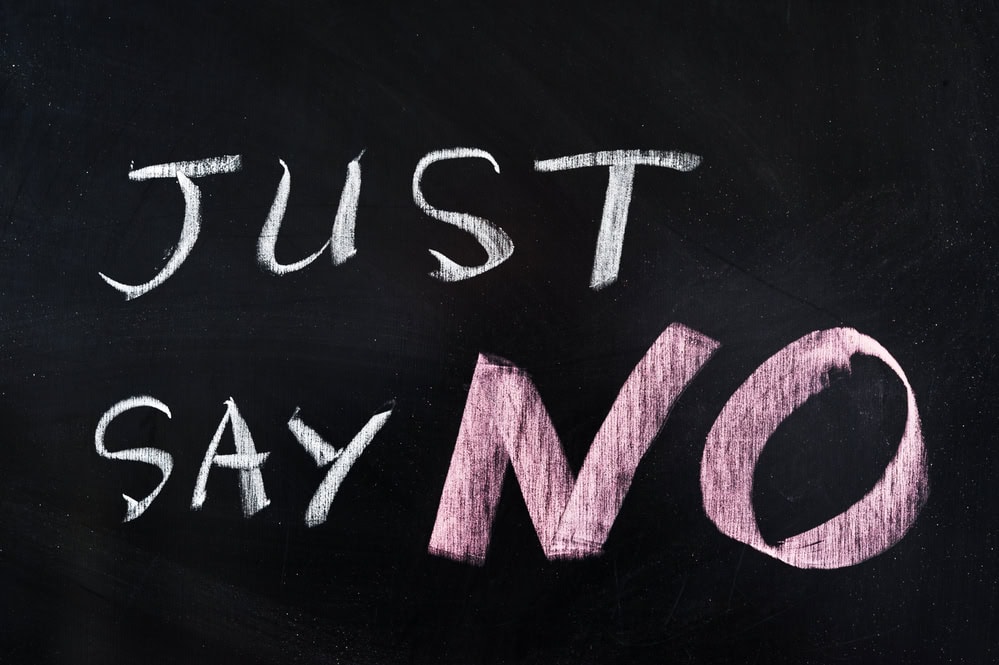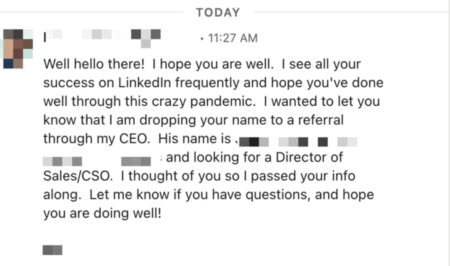
How to Walk Away From a Bad Business Deal Without Burning Bridges
It’s a BIG, small world.
There’s an art and a science to walking away from a business deal – especially when you want to keep relationships intact.
In my experience, 99% of bad sales deals can be handled with grace and understanding. So, if you ever find yourself in the middle of a deal that’s going south and don’t want it to spill over into your market or network, you need to be prepared to handle them head-on.
The trick?
Preparation.
It’s important not to fall into the trap of thinking that a bad deal = negatively impacted relationships + your business takes a huge hit.
This mindset keeps people from walking away when they need to, which can lead to an outcome that’s much worse in the end!
The reality of sales, startups, and business is that there are bad deals and bad relationships to navigate. And it’s never worth prolonging them just for the sake of your bottom line.
Once you see the writing on the wall, it’s time to kick your exit strategy into motion.
What walking away can look like.
Just last week, I had to say “no thank you” 7 times to Founders that I would’ve loved to help, but what they needed and the stage they were at didn’t map back to me.
In one particular circumstance, it was my second call, and we were vibing. When we dug into the size of their company, the role, and the work itself, that’s when it became clear that as much as I liked him, I recognized that their stage and the kind of leader needed to do the job well are not my sweet spot. I would be more of a hindrance than a help.
Time for the hard part of the conversation.
So, I raised my hand, threw up the white flag, talked about what I was hearing, talked about what we do best and why and listened to what he had to say.
As much as I wanted to convince them I was the “one,” I noticed that red flag and owned it.
I explained, “when I feel this way, it’s a signal that something is off. Your requirements to get it right don’t align with our best work, and the last thing I want to do is hold you back.”
He thanked me for not trying to sell him, and we mutually agreed it didn’t make sense, I shared a few things he could do that would be useful, and at the end of the call, he asked me how he could help me.
WHAT?!
Be still my heart!
He even commented on a LI post singing my praises afterward… this is exactly what you want to happen if a deal doesn’t make sense.
Now the door’s wide open for the long game.
I can’t stress how important this is. Even if things aren’t destined to work out in the short term, you never know what can happen down the line.
Case in point: it’s not uncommon for me to receive messages from people I haven’t spoken to in YEARS.

When you burn bridges, you only end up burning yourself. You never know when your paths might cross again.
The faster we get to no, the more time we spend with yes.
OK, it’s time to get your internal compass calibrated.
When your gut tells you things aren’t heading in the right direction, take that as a cue to dig deeper together and on your own.
But be sure to do this from an objective, rational perspective. The last thing you want is your emotions driving the ship.
Step back and ask yourself a few questions to gain some clarity:
- Is this actually a bad situation, or can it be corrected?
- What are some of the ways we can fix it, and how realistic are those solutions?
- Are you in a legally binding contract?
- What obligations do you have to fulfill?
- If you terminate the contract, what can you do to ensure you don’t leave them in the ditch?
Then turn the focus to them and take notes so you can uncover those pain points and understand the full picture of what’s going on. You want to be clear on the core issue BEFORE you take any action.
Everything you uncover in your quest for clarity will impact how you move forward. Often, the situation isn’t as bad as you think it is, and you can correct it by setting/resetting the stage (read: better communication).
However, if that’s not the case, you need to be prepared for the tough conversation that needs to happen.
For the record, I say no more than I say yes in my business. Even though walking away may signal the end of the conversation, I work hard to keep the possibility open for something else in the future.
The faster we get to no, the more time we can spend with yes.
It all circles back to setting expectations early and often. We’re not going to be aligned with every business opportunity that comes our way, and that’s okay.
Pro tip: this is when the power of using a journal is your best friend. Listening to ourselves to look for patterns and themes is a powerful way to understand what’s going on while pinpointing solutions.
Know your Ideal Customer Profile (ICP) like the back of your hand.
As they say, prevention is better than cure. Arming yourself with knowledge and an understanding of your market upfront limits the potential of getting into icky situations in the future.
Before you ever put your sales hat on and try to close deals, you need to have your ideal customer profile nailed down – and please don’t rely on someone else to figure it out for you.
Taking shortcuts here means that you end up less informed, and it’s more likely that you’ll end up in a bad deal situation. It will also undoubtedly end up costing you more in the end.
When you’re clear, everything that you bring to a meeting – and the other person you’re speaking with – is clearer too.
Coming in unprepared or unclear on where you stand only adds confusion to the mix that doesn’t need to be there.
Tips to NOT burn bridges if things go south.
Ultimately people want to be seen, heard, and understood. When we show them we heard them and clearly explain how we can’t connect the dots on their main goals, they feel seen and heard – even though we can’t achieve what they want.
Don’t treat any bad deal as a failure. Every deal – good or bad – is an opportunity to learn and grow.
Here are a few actionable tips to take with you:
- Always send a thank you note
Regardless of the outcome of a deal, don’t pass up the opportunity to show appreciation to the other side. We’re all human at the end of the day.
People always remember when you take the time to connect with them. A thank you note shows that you’re willing to leave the past behind and are open to reconnecting in the future.
- If possible, make a referral or introduction to someone else
Often when things don’t work out, I know somebody in my network who could be a good fit. Never hesitate to share a professional connection if that person could potentially help solve the issue.
- Offer helpful, actionable advice that you can
Anything you can share that will help them address their top priorities will be much appreciated and not forgotten.
- Set expectations early and often
If you ever find that it’s clear that your goals are dramatically different or the items you had previously agreed upon went out the window, the next step is to lay it all out on the table and outline why you’re moving on.
Setting expectations early and often makes it much easier to identify when things are going off track.
- Never cut ties with a customer cold-turkey
It’s much more beneficial for both sides to have an informed discussion around the issues you found, create an outline of everything, and set a timetable for when the partnership will end.
Help them find a solution if you can too. This can be a referral or simply sticking it out with them long enough for them to find the right person.
They WILL remember this. It’s rare for people to genuinely want to help others when there’s nothing in it for them in the immediate future.
Wrapping Up
Your customer’s need for a solution is greater than your need to make a sale.
The honesty and transparency you’ll bring to the table will make you stand out. There are so few people who actually do this, and it’s magnetic as a buyer when you find someone who does… even if the dots don’t immediately connects.
TL;DR be helpful, and they will remember you.
